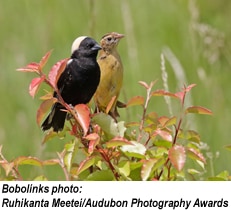CLIMATE CHANGE
Our planet’s changing climate is the most significant conservation issue of this time. While some people deny this change or contend that humans have no responsibility for it, the Northwest Illinois Audubon Society believes we must act.

The National Audubon Society’s Survival by Degrees Report: 389 Species on the Brink, released in October 2019, indicated that future climate change will put two-thirds of birds in North America at risk of extinction due to projected range losses. Of the 604 species analyzed, none were projected to remain untouched by either climate-driven range loss or extreme weather, sea level rise, or other climate change-related threats. National Audubon Society also provided information on how climate change will affect Illinois’s Birds, such as Bobolinks, Scarlet Tanagers, and Red-headed Woodpeckers.
Our Chapter provides programs and activities to educate the public about climate change and each individual’s opportunities for action.
We suggest three paths that all of us can follow:
Reduce your carbon footprint
Influence our energy and climate policy
Get involved and continue to learn
Reduce Your Carbon Footprint
Our daily activities, such as heating our homes, driving our cars, water usage, and diet, can increase the amount of greenhouse gases that influence climate change. Though some people may think that getting millions of people to change their personal habits and energy usage is a daunting task, this is where each of us could start.
Calculate your carbon footprint.
Use the Carbon Footprint Calculator to discover your household’s contribution to the global CO2 problem.
You will need to gather some preliminary data – such as your utility bills, automobile use, and travel records – but calculating your carbon footprint will only take a few minutes. Don’t be too surprised when you get the result. Many of our “normal” lifestyle choices have negative impacts to the environment that we might not realize.
Once you have calculated your footprint, we suggest the following to reduce your footprint:
Get an energy audit.
Many energy companies offer these for free and can be a good first-step into energy conservation.
Increase efficiency of existing HVAC systems in your home. Get regular tune-ups and change filters.
Improve the insulation in your homes. This can reduce the burden on your HVAC systems and ensure that they are used at their most efficient level.
Rethink your lawn. Plant native plants, which can absorb carbon dioxide and provide habitat for local wildlife.
Cut down on water use and water heating. Using cold water when washing clothes is just as effective as using hot water, but saves energy. Reduce the amount of water used for daily activities as well. Using a dishwasher with a full load is often more efficient than hand-washing.
Update home appliances, systems, and light bulbs that are more efficient. Look for Energy Star labels that can help consumers identify energy efficient appliances. LED light bulbs are more energy-efficient than incandescent bulbs.
Power your home with renewable energy. Research whether your utilities offer renewable sources or choose one that does. Consider participating in a community solar project. If possible, install solar panels for your home.
Eat the food you buy and reduce food waste. Food waste not only wastes money but also increases greenhouse gases when it rots in a landfill. Plan your meals ahead of time and purchase/grow only the food needed. Consider composting the appropriate waste as well to prevent food waste from entering the landfill.
Eat less meat or consider vegan and/or vegetarian diets. The meat industry is energy intensive as well as land-use intensive. A large amount of land is used for grazing and/or food for the animals, which typically requires large amounts of water, fertilizer, herbicides, and pesticides on top of the deforestation that occurs to create the space. Ruminant animals, such as cattle, also release methane, which is a more potent greenhouse gas. Start small with “Meatless Mondays” and start a produce garden, which will help change your palate and foster creativity in meal planning.
Consider different modes of transportation. Instead of flying, use public transportation, buses, and/or trains, which can release less emissions. Using a bike or walking releases no emissions and is also healthier! If possible, consider investing in a fuel-efficient vehicle and for any vehicle, maintain it by keeping tires inflated and changing filters.
The National Audubon Society provides a Climate Action Guide, which provides abundant information on how to make a difference.

Influence Our Energy and Climate Policy
A large percentage of the greenhouse gases that are driving climate change are generated by activity beyond the immediate scope of individual consumers. The industrial base that creates the consumer goods and the business and government actions that provide our products and services are a major source of our climate crisis.
In a democratic society we can clearly influence these activities by our votes and political actions. Here’s what you can do:
- Contact your local, state, and national lawmakers. Northwest Illinois Audubon Society’s 501c(3) status prevents us from working as a group for specific political candidates. But as individuals, to address climate change, we must elect and support lawmakers who are committed to do so. Each of us can and should support the candidates whose positions show the most promise for protecting our environment and creating a more sustainable culture.
Capitol Switchboard: 202-224-3121
State House Switchboard: 217-782-2000
When using either switchboard, simply ask to be connected to the legislator’s office.
Federal
Senator Richard Durbin
230 S. Dearborn
Suite 3892
Chicago, IL 60604
312-353-4952
Senator Tammy Duckworth
230 S. Dearborn, Suite 3900
Chicago, IL 60604
312-886-3506
16th District
Rep. Darin LaHood
100 NE Monroe Street Room 100
Peoria, IL 61602
308-671-7027
17th District
Rep Eric Sorenson
2401 4th Ave.
Rock Island, IL 61201
State
45th District
Sen. Andrew Chesney
50 W. Douglas Street, Suite 1001
Freeport, IL 61032
[email protected]
36th District
Sen. Michael Halpin
1504 3rd Ave., 2nd Floor
County Office Building
Rock Island, IL 61201
309-736-7084
89th District
Rep. Tony McCombie
9317B Il Route 84
Savanna, IL 61074
815-291-8989
90th District
Rep. John Cabello
1702 Hutchins Rd.
Machesney Park, IL 61115
815-974-0090
74th District
Rep. Brad Fitts
101 W 1st Street., Suite 501
Dixon, IL 61021
71st District
Rep. Daniel Swanson
275 N Division St. P.O. Box 173
Woodhull, IL 61490
309-334-7474
Other organizations committed to educate
and address the climate crisis:
- 350.org is building a global grassroots movement to solve the climate crisis
- Environmental Study Group strives to build local understanding of environmental issues and to encourage efforts that contribute to the environmental health and sustainability of the Freeport, Illinois community.
- Illinois Environmental Council engages in education and outreach and provides a forum for environmentalists
- Low Carbon Diet Program by the Empowerment Institute provides information and simple actions on how to reduce your personal carbon footprint.
- NASA Climate Change provides scientific evidence for climate change with educational resources
- The Nature Conservancy of Illinois is a global nonprofit dedicated to conserve the lands and waters on which all life depends and has helped protect more than 100 sites throughout Illinois.
